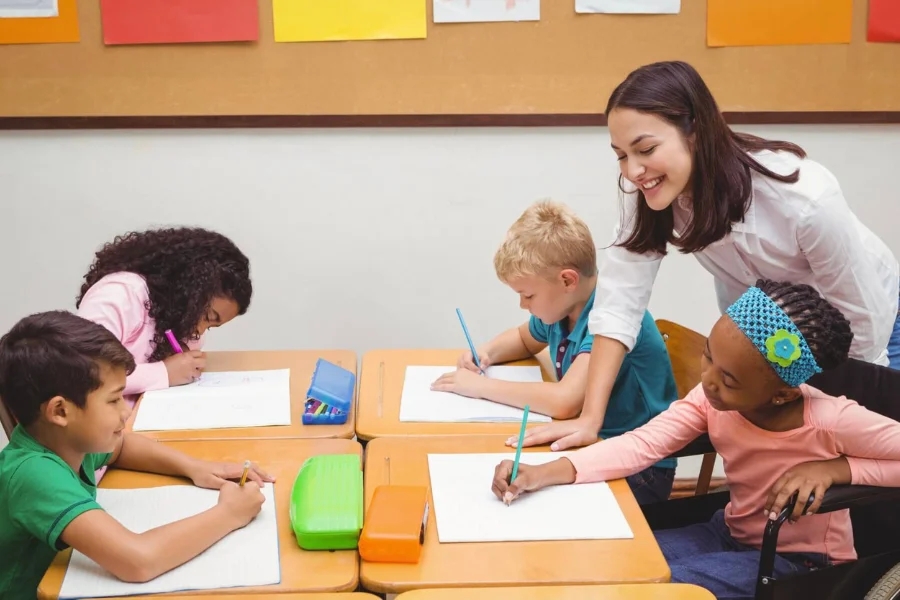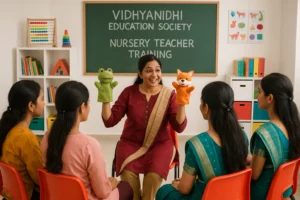
Source: theconversation
Inclusive Education is now recognised as an indispensable part of our education system, facilitating academic excellence for every child irrespective of their backgrounds, learning needs, and learning styles. Schools now make it a point to recruit skilled Special Education Professionals, offering them decent pay packages and ensuring that every child learns in a manner that suits their learning preferences.
This has led to a huge surge in the demand of SEN Teacher Training as this Special Education Industry will be evolving and growing steadily. SEN teacher training prepares educators with impeccable skills and in-depth understanding of various learning and behavioural disorders and helps them navigate their ways through the challenges of a diverse classroom.
What is Special Education Teacher Training?
Special Education Teacher Training aims to train aspiring special educators with qualities and information essential to aid the learning of children with special needs. This training comprises of theoretical knowledge and practical classroom management where candidates get to apply the knowledge they have gained.
This training equips teachers to understanding various strategies and pedagogies to cater to the diverse needs of children and enable them to function independently in a classroom with minimal assistance.
Key elements of Special Education Teacher Training often include:
- Knowing several kinds of developmental problems and learning difficulties.
- Creating inclusive classroom environments and lesson programs.
- Applying individualized education plans (IEPs).
- Using assistive technology and tools.
- Promoting positive behaviour and emotional support.
Completing Special Education Teacher Training helps teachers to be more ready to provide organized education, boost student confidence, and provide a useful atmosphere in which every kid may grow.
What is the Meaning of a Special Education Course?
A Special Education Course is a professionally certifying program that trains aspiring teachers to understand is thoughtfully plan to manage the varied challenges posed by different disabilities and impairments. This program educates teachers to ascertain the focal potencies of children based on which they can plan their lessons, aligning perfectly with the learning preferences. This makes learning a smooth, enjoyable process for children, boosting their morale and self-confidence.
This course comprises sufficient hours of practical training through an means of internship in any school of the trainee’s choice. This practical classroom management is highly important to understand the functioning of a classroom and helps them manage the complexities of a classroom effortlessly.

Source: stock.adobe.com
A Special Education Course typically includes:
Focus on Special Needs
Understanding intelligent, developmental, emotional, and behavioural changes in students.
Curriculum and Pedagogy
Learning specialized teaching approaches, modified curriculum, and using targeted assessment tools.
Legal and Ethical Frameworks
Being aware of the different laws, policies, and benefits that children with special needs are entitled to and ensuring that they get them without any complications.
Teamwork and Partnership
Learning ways of how to get various professionals, parents, and educators to collaborate and work together to support the child’s overall progress.
Types of Special Education Courses
Options may focus on specific areas such as autism, learning disabilities, sensory impairments, or intellectual disabilities.
A Special Education Course helps to build a strong foundation of knowledge, skills, and potencies, training candidates to devise exclusive learning experiences based on the diverse needs of children.
Vidhyanidhi Education Society (Govt. Regd.) offers a top-notch Special Education Course that has created flourishing teaching careers for thousands of teachers who aim to achieve positive learning outcomes for all children.
To download the brochure about SEN Course, Click Here!
For more details on the SEN Course, Call/WhatsApp at +919321024137 / +919869866277
What is the Definition of a Special Teacher?
By definition, a Special Teacher or a Special Educator is a skilled professional who has undergone the essential training necessary for supporting the needs of students by providing them with customised instructions and adapting teaching methods to suit the learning styles of children with special needs.
A Special Educator is a friend, philosopher, and guide for students whose constant support and guidance help each child feel competent and confident to lead successful lives.

Source: theconversation
Here’s how special teachers make a difference:
Individualized Instruction and Support:
- Design Educational Plans that suit the individual needs of children, giving importance to their strengths.
- Make the desired changes in teaching methods so that they adhere to the learning preferences of the child.
- Give children one-to-one attention to ensure that learning goals are achieved.
Creating Inclusive Environments:
- Work with general education teachers to include students with disabilities in regular classrooms
- Foster an inclusive setting that encourages social interaction and participation
- Help students build communication and emotional regulation skills
Meeting Behavioural and Emotional Needs:
- positive approaches to Behaviour and behavioural challenges
- Make a safe zone for knowledge and personal insight.
- Give emotional recourse and guidance to help students cope with frustration, worry, or low self-assurance.
Working with Parents and Other Professionals:
- Update parents about their child’s development and objectives.
- Work together with counsellors, therapists, and other experts.
- Helping parents to inspire their kids’ learning at home.
Institutes like Vidhyanidhi Education Society offer Special Education Courses that train teachers to take on the role of a special teacher, preparing them with practical skills, knowledge, and confidence to make a long-lasting impact on students’ lives.
Difference between a Special Teacher and a General Teacher?
Special teachers and General teachers both are important characters in a child’s education, although their focuses, preparation & responsibilities vary among them. While both have the goal to support students’ growth, their delivery style in teaching is personalized to fit individual student needs
Here is a clear breakdown of the differences between a special teacher and a common teacher:
Focus of Instruction
Special Education Teachers:
Work with students in a classroom and understand their challenges, difficulties and devise strategic approaches to make learning an easy task for them.
General Education Teachers:
Teach the standard curriculum to a broad group of students in mainstream classrooms, focusing on grade-level learning goals for all.
Training and Expertise
Special Education Teachers:
Get specialized training in disabilities, Individualized Education Programs (IEPs), and teaching methods designed for diverse learning needs.
General Education Teachers:
Trained in general pedagogy, subject-specific knowledge, and classroom management for a traditional classroom setting.

Roles and Responsibilities
Special Education Teachers:
- Develop and implement IEPs
- Provide personalized instruction and modifications
- Collaborate with parents, general teachers, and specialists
- Advocate for students’ educational needs and rights
General Education Teachers:
- Deliver lessons based on the general curriculum
- Manage classroom behaviour and routines
- Assess student performance
- Coordinate with special education staff to support inclusive learning
Classroom Setting
Special Education Teachers:
Depending on the requirements of the students, work in resource rooms, specialized classrooms, or teach together in inclusive classrooms.
General Education Teachers:
Usually teach in mainstream classrooms with a varied student population.
Both roles are essential in building an inclusive and effective education system. Special education teachers, in particular, receive dedicated training to meet specific learning needs—programs like those offered by Vidhyanidhi Education Society are designed to prepare educators for these meaningful roles.
Join Vidhyanidhi Education Society’s SEN Course Today! Support Growth, Spark Potential, Transform Lives!
For more details on the SEN Course, Call/WhatsApp at +919321024137 / +919869866277
To download the brochure about SEN Course, Click Here!
FAQs
What is a Teacher of SEN?
A Teacher of SEN supports students with special educational needs through modified teaching, helping them succeed in academic and personal growth.
What is the Full Form of SEN in Diploma?
SEN stands for Special Educational Needs in diploma courses, concentrating on preparing teachers to support students with learning and developmental difficulties.
What is the Significance of SEN?
SEN ensures inclusive education by addressing individual learning needs. Courses like those by Vidhyanidhi Education Society prepare teachers for this vital role.



